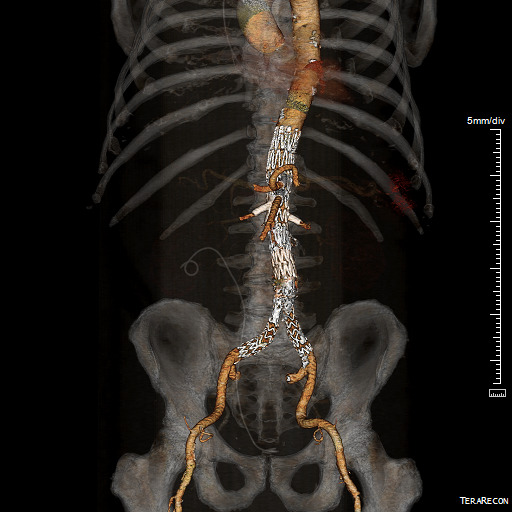London Health Sciences Centre (LHSC) is the first in the region to introduce a non-invasive advanced aneurysm repair method that reduces a patient’s hospital stay by 80 per cent, improving recovery time by 11 months.
Like all health care organizations across the province, LHSC strives to find innovative solutions to improving access and flow within the hospital, while delivering on its commitment to patient-centered care. Recently, the vascular surgery team at LHSC adopted a new approach to managing life-threatening aortic aneurysms, which not only decreases a patient’s hospital stay from four weeks to three days but decreases overall recovery time from a year to just one month.
“This is a game changer for us,” said Dr. John Landau, a vascular surgeon at LHSC. “We frequently perform endovascular repairs; however, this new approach is so personalized through a patient’s anatomy, allowing us to remove the aneurysm quickly and effectively, resulting in a speedy recovery. The normal procedure would require the patient to stay up to several weeks in hospital, but we’ve seen patients leave as soon as three days returning to the comfort of their own home shortly after the procedure.”
Endovascular aneurysm repair (EVAR) is a minimally invasive procedure used to manage abdominal aortic aneurysms. This advanced life-saving method uses a custom-made endovascular stent-graft, placed in the aorta which is the largest artery that carries blood from your heart to other parts of the body to prevent it from rupturing. This is completed using x-ray guidance through a tiny incision in the groin no larger than a drinking straw. The procedure prevents the abdominal aortic aneurysm from bursting which is a life-threatening event, significantly decreasing the risk of death or major complications compared to a large open surgery.
For 75-year-old Mr. Thomas Barker, this advanced aneurysm repair saved his life. In 2017 underwent an aortic valve and coronary bypass, later discovering he had an aneurysm and was referred to LHSC to be considered for advanced endovascular repairs.
“I am beyond grateful for Dr. Landau and his team,” said Thomas Barker. “Not only did they save my life, but they gave me the gift of being home with my family sooner. No one wants to stay at a hospital longer than they have too, so being able to check-out in three days was a blessing. It’s been two and a half months since I had the procedure and I am back to my normal self, thoroughly enjoying doing yard work and golfing with friends and family.”
Due to the success of this minimally invasive procedure, there are plans to do several of them in the fall at LHSC while ongoing research for advanced endovascular outcomes continues. LHSC has several similar surgeries scheduled for the fall of 2022




